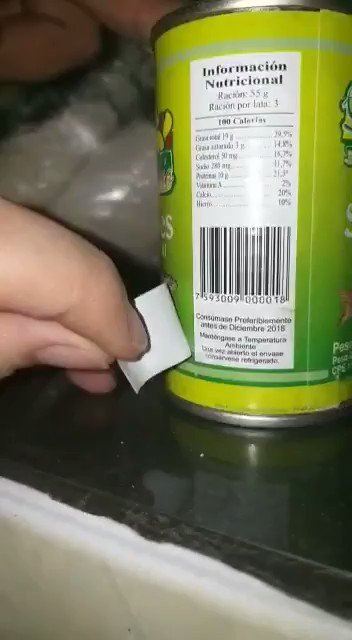Venezuela’s socialist propaganda network celebrated the triumph of a “sardine caravan” Thursday in Aragua state, where impoverished local residents allegedly received 15 tons of sardines.
Protein is difficult to procure in Venezuela, a country where at least 15 percent of residents eat garbage to survive. Many are forced to depend on the Local Committees for Supply and Production (CLAP), a socialist bureaucratic organization that hands out “aid” boxes in urban neighborhoods. The CLAP boxes often come with expired milk, insect-ridden rice, and little else – and socialist CLAP leaders have full power to decide who receives one, meaning anyone vocally opposed to Nicolás Maduro’s regime will not get one.
Maduro announced two months of “Christmas happiness” beginning on November 1. Venezuelans, like many Latin Americans, traditionally eat roast pork for Christmas, but, under socialism, Maduro is attempting to replace that tradition with sardines, one of the few easily attainable food items in the country.
Even these have not been without incident. In September, local officials in western Táchira state reported dozens of people fell ill after eating government-distributed expired sardines.
Last week, a video went viral in the country of a woman exposing the expiration date on a can of CLAP sardines, hidden by government officials: “December 2018.”
Despite the outrage over the dangerous nature of government-issued expired sardines, VTV, the state news network, applauded government agents on Thursday for distributing 15 tons of sardines in Aragua.
VTV claimed that distributing sardines was one of Maduro’s key policies beacuse “this protein has high nutritional value with omega-3s, minerals, and vitamins B1 and B2 at an empathetic price.”
“We are grateful to our President Maduro for bringing us these sales that allow us to acquire sardines at an affordable price,” a local resident identified as Jackson Páez told the state propaganda outlet.
Maduro has not been legally president since January, when the National Assembly used its constitutional power to replace him with its legislative president, Juan Guaidó. The Venezuelan military – known to run cocaine trafficking operations that benefit Maduro – has not recognized Guaidó, making it impossible for him to govern, and Guaidó has refused outside intervention to help Venezuela restore order.
VTV claimed that “over 6,000 families” received sardines.
The Maduro regime has been touting its efficiency in acquiring sardines all year. In July, the “Sardine Caravan” touched down in Sucre state, claiming that government fishermen had collected 165,900 kilograms of the fish to distribute nationally.
Sardines are significantly cheaper than most other animal proteins in the country, leading to a significant push on the part of the government to attract more interest in eating them. As of November, a kilo of sardines costs about 6,000 bolívars ($0.18). The price of ground beef, in contrast, is about 60,000 ($1.78) bolívars a kilo. The national minimum wage is 150,000 bolívars ($4.44). All currency conversions are based on the real value of the bolívar as estimated by the Venezuelan economic website DolarToday, which Maduro banned from the country for exposing the true weakness of the bolívar.
Venezuelans already replaced traditional hams and other meats with sardines on Easter and appear to have no other resort for Christmas. Eating government-issued sardines is a risky affair, however, as dozens have reportedly gotten sick, and at least one shipment arrived to Venezuelans with its extremely old expiration date obscured by a tag.
A woman who chose to hide her identity published a video on social media this month showing her CLAP-issued can of sardines boasting an oddly placed sticker. Pulling the sticker off, she revealed the expiration date of the sardines she was expected to eat: December 2018.
“Expired since December 2018 and these scoundrels use a tag to hide the true date so people will eat it,” she says in the video. “What do you think? Shameless people who play with the hunger of all Venezuelans.”
Fernando Andrade Roa, the former mayor of Michelena, Táchira, had warned two months prior that government sardines were causing illnesses in his town.
“Over 40 people were intoxicated after consuming sardines distributed through the CLAP in various sectors,” he alleged, adding that Venezuela’s hospitals lack most basic medications and boast outdated or broken equipment, making it nearly impossible to treat those affected.
CLAP boxes have carried expired, infested, or otherwise tainted materials for at least a year. In March 2018, outraged Venezuelans posted images of their CLAP boxes to social media, revealing small bags of rice full of weevils, “yellow” curdled milk, and a total lack of other basic items Maduro promised, such as beans and flour. One CLAP box is supposed to last a month for every household.
The CLAP boxes were issued after a wave of desperate attempts to survive killed dozens of Venezuelans who ate expired foods from garbage or poisonous produce like bitter yuca. Yuca is a tuber common in Latin American food, typically boiled and marinated with garlic or turned into fries. The yuca sold in American supermarkets is different from a strain of bitter yuca, typically with bitter flavor, pinkish color, and tougher skin, which can be fatal to humans. Dozens of Venezuelans died in 2017 eating bitter yuca as a last resort.
https://www.breitbart.com/latin-america/2019/11/22/venezuela-celebrates-feeding-people-expired-sardine-caravan/



No comments:
Post a Comment